The Golden Spice & Your Feline Friend: Can Cats Eat Turmeric Safely? (Vet-Reviewed Deep Dive)
- 14 Apr 2025 11:04
Turmeric, the vibrant golden spice renowned for its earthy flavor and potential health benefits in humans, has gained significant popularity in the wellness world. Its active compound, curcumin, is studied for its anti-inflammatory and antioxidant properties. As health-conscious pet owners, it's natural to wonder if these benefits could extend to our feline companions, leading to the question: can cats eat turmeric? Is this ancient spice a safe addition to their diet, or does it pose hidden risks for our obligate carnivore friends?
The answer is complex and requires extreme caution. While turmeric itself isn't listed as highly toxic to cats in the way some plants or chemicals are, its use is **not generally recommended without explicit veterinary guidance**. Cats have unique metabolic systems vastly different from humans, making them sensitive to many substances, including herbs and spices. This comprehensive guide, adhering to E-E-A-T principles (Experience, Expertise, Authoritativeness, Trustworthiness) and reviewed for veterinary accuracy, will explore the potential (though largely unproven in cats) benefits, significant risks, safety considerations, and the crucial need for professional consultation before ever considering adding turmeric for cats into their routine.
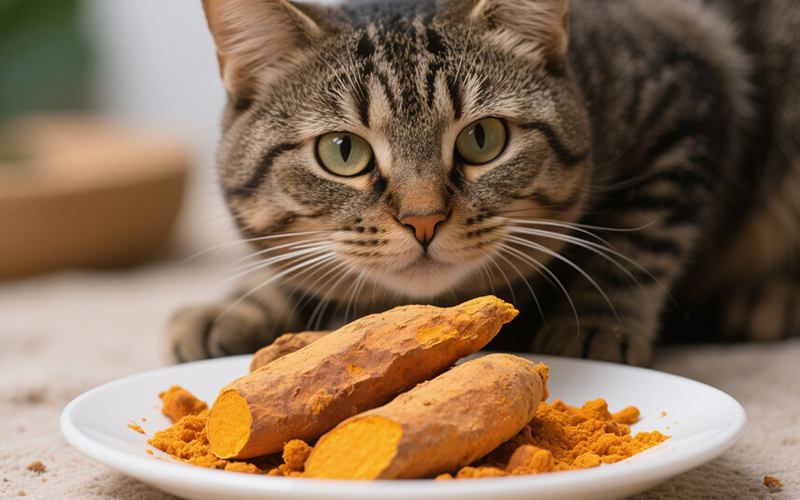
What is Turmeric and Curcumin?
Turmeric is a spice derived from the root of the *Curcuma longa* plant, a member of the ginger family. It's been used for centuries in cooking (especially in curries) and traditional medicine (like Ayurveda). The main active component responsible for its bright yellow color and most of its purported health effects is **curcumin**. Curcuminoids (curcumin and related substances) are polyphenols studied for various properties, including:
Anti-inflammatory effects
Antioxidant activity
Potential anti-cancer properties (in lab studies)
Other potential benefits related to brain health, heart health, and more (primarily studied in humans or lab models).
However, it's crucial to note that curcumin has low bioavailability, meaning it's not easily absorbed or utilized by the body on its own. Absorption is often enhanced by combining it with black pepper (piperine) or fats – combinations that introduce their own considerations for cats.
Feline Physiology: Why Cats Handle Substances Differently
Before considering any herb or supplement for cats, understanding their unique physiology as **obligate carnivores** is paramount:
Metabolism:** Cats lack certain liver enzymes (crucially, specific glucuronidation pathways) that humans and dogs use to process various drugs, toxins, herbs, and spices. This makes them highly susceptible to toxicity from substances safe for other species (e.g., certain essential oils, NSAIDs, onions, garlic).
Dietary Needs:** Their bodies are designed to run on animal protein and fat. They have no dietary requirement for carbohydrates or most plant-based compounds like curcumin.
Digestive System:** Their short digestive tract is optimized for meat, not for processing significant amounts of plant matter or complex plant compounds.
This biological uniqueness means we cannot simply extrapolate human or even canine benefits and safety data for turmeric directly to cats. Extreme caution is always necessary.
The Direct Answer: Is Turmeric Safe for Cats? (With Major Caveats)
So, let's address the core question: can cats eat turmeric?
Non-Toxic (Generally, in Tiny Amounts):** Turmeric spice itself, in *extremely small, culinary amounts* (like a tiny pinch accidentally licked off a plate), is generally considered non-toxic and unlikely to cause immediate severe poisoning.
**NOT Recommended Without Vet Guidance:** Despite low acute toxicity risk in minute amounts, intentionally adding turmeric to a cat's diet is **not recommended** without consulting a veterinarian knowledgeable about feline metabolism and herbal supplements.
**Potential for Harm:** Even small amounts can cause side effects in sensitive cats, and incorrect dosage or form (like certain supplements or essential oils) can be harmful or even dangerous.
**Lack of Feline-Specific Evidence:** Robust scientific studies demonstrating clear benefits and safe dosages specifically *in cats* are currently lacking. Much of the perceived benefit is anecdotal or extrapolated from other species.
The bottom line: While not poisonous like lilies or antifreeze, turmeric is not inherently "safe" to add freely to a cat's diet. Its use requires careful consideration and professional oversight due to potential risks and uncertain benefits in felines.
Potential *Hypothesized* Benefits of Turmeric/Curcumin for Cats
Why might someone consider turmeric for their cat? The potential benefits, largely based on curcumin's properties studied in other species, include:
1. Anti-inflammatory Properties
Mechanism (in theory):** Curcumin is known to inhibit inflammatory pathways (like COX-2, NF-kappaB) in lab studies and some human/animal models.
Potential Application:** This leads to speculation it *might* help with inflammatory conditions in cats, such as arthritis (osteoarthritis), inflammatory bowel disease (IBD), or stomatitis. **However, strong clinical evidence specifically for cats is limited.**
2. Antioxidant Effects
Mechanism (in theory):** Curcumin can neutralize harmful free radicals and potentially boost the body's own antioxidant enzymes.
Potential Application:** Might theoretically support overall cellular health and combat oxidative stress associated with aging or chronic disease. Again, feline-specific data is sparse.
3. Other Speculated Benefits
Anecdotal reports sometimes mention potential benefits for pain relief (related to inflammation), cognitive function, or even cancer support, but these are largely unproven in cats and should **never** replace conventional veterinary treatment.
**Crucial Caveat:** These are *potential* benefits based on limited evidence, mostly not specific to cats. They must be weighed against tangible risks.
Significant Risks and Concerns of Turmeric for Cats
This is where extreme caution is necessary. Feeding turmeric to cats carries several potential risks:
1. Gastrointestinal Upset (Most Common)
Irritation:** Turmeric can irritate the digestive tract lining, especially in higher doses or sensitive individuals.
Symptoms:** This is the most frequently reported side effect and can include **vomiting, diarrhea, gas, bloating, nausea, and loss of appetite.**
2. Blood Thinning Effects (Anti-platelet Activity)
Mechanism:** Curcumin has been shown to have anti-platelet effects, meaning it can interfere with blood clotting.
Risks:**
This is particularly dangerous for cats scheduled for **surgery** (increased bleeding risk). Turmeric should be stopped well in advance (consult vet for timeline).
It could potentially worsen bleeding in cats with clotting disorders or those already taking anticoagulant medications (blood thinners).
3. Drug Interactions
Anticoagulants:** As mentioned, can increase bleeding risk when combined with drugs like clopidogrel, warfarin, or even high-dose fish oil.
NSAIDs (Non-Steroidal Anti-Inflammatory Drugs):** Combining turmeric with NSAIDs (like meloxicam, robenacoxib) might increase the risk of stomach ulceration or bleeding, as both can affect the GI lining and potentially platelet function.
Diabetes Medications:** Turmeric might potentially lower blood sugar; combining it with insulin or other diabetes drugs could risk hypoglycemia (low blood sugar).
Stomach Acid Reducers:** May interfere with drugs like famotidine or omeprazole.
**Chemotherapy Drugs:** Potential interactions exist; **never** give supplements during cancer treatment without oncologist approval.
Always inform your vet about *any* supplements your cat takes, including turmeric.
4. Staining
Practical Issue:** Turmeric's vibrant pigment stains fabrics, surfaces, and potentially light-colored fur around the mouth very easily and persistently.
5. Taste Aversion
Palatability:** Turmeric has a strong, earthy, slightly bitter flavor. Many cats find it unpalatable and will refuse food containing it. Forcing supplements can cause stress and food aversion.
6. Dosage Sensitivity & Overdose Risk
Lack of Standard Dose:** There is no established safe and effective dosage of turmeric or curcumin specifically for cats. What might be safe for one cat could cause side effects in another.
Supplement Concentration:** Turmeric supplements often contain highly concentrated curcumin extracts, sometimes combined with absorption enhancers like piperine (black pepper extract). This significantly increases the potency and potential for side effects or overdose compared to the culinary spice. Piperine itself can also irritate the GI tract.
7. Potential Liver or Gallbladder Issues
Caution Advised:** While not definitively proven problematic in cats at low doses, turmeric can stimulate bile production. It's generally advised to use caution or avoid it in cats with pre-existing liver disease or gallbladder obstruction. High doses of *any* supplement place extra load on the liver for metabolism.
8. Quality Control of Supplements
Contaminants/Fillers:** The supplement industry is not tightly regulated. Products may contain contaminants (heavy metals, pesticides), incorrect dosages, or undisclosed fillers that could be harmful to cats. Choose reputable, third-party tested brands if using supplements (under vet guidance).
Raw vs. Cooked vs. Supplements: Which Form Matters?
Raw Turmeric Root:** Not commonly used. Higher potential for GI upset due to fiber and unrefined compounds. Lower curcumin bioavailability. Not recommended.
Dried Turmeric Spice (Culinary):** Lower curcumin concentration than supplements. Bioavailability is poor unless combined with fat/piperine (which add risks). Tiny pinch unlikely toxic, but larger amounts risk GI upset.
Cooked Turmeric (in Food):** Cooking might slightly improve bioavailability, especially with fats. Still requires caution regarding dosage and GI effects. Cooking doesn't eliminate risks like blood thinning.
Turmeric/Curcumin Supplements:** Most potent form, highest potential benefit (if any) but also **highest risk** of side effects and overdose due to concentration and potential additives (like piperine). **Requires strict veterinary guidance and dosage calculation.** Never use human supplements without vet approval and dose adjustment.
Dosage: The Critical Missing Piece (Why Vet Guidance is Essential)
There is **NO universally accepted safe and effective dosage** of turmeric or curcumin for cats established through rigorous scientific study. Dosages found online are often anecdotal or extrapolated from other species and may be dangerous.
Factors influencing a potential dose (determined ONLY by a vet) include:
The cat's weight and overall health status.
The specific condition being addressed (if any).
The form of turmeric/curcumin being used (spice vs. supplement concentration).
Potential drug interactions.
Individual sensitivity.
**Never attempt to dose turmeric for your cat yourself.** The risk of causing harm outweighs any potential unproven benefit. A vet consultation is mandatory.
How to *Safely* Offer Turmeric (ONLY If Approved and Dosed by a Veterinarian)
If, after a thorough discussion of risks and benefits, your veterinarian recommends and provides a specific dosage of a particular turmeric/curcumin product for your cat, safe administration typically involves:
Use the EXACT Product & Dose Prescribed:** Do not substitute brands or forms without approval.
Start VERY Small:** Begin with an even smaller dose than prescribed to assess tolerance.
Mix Thoroughly with Food:** Usually mixed into wet food to mask the taste and potentially buffer the stomach. Adding it with a small amount of healthy fat (like fish oil, *if appropriate for the cat*) might aid absorption but discuss this with your vet. Avoid black pepper (piperine) unless it's part of a specific veterinary formulation and approved.
Monitor Intensely:** Watch closely for any signs of GI upset (vomiting, diarrhea, appetite loss), lethargy, or other adverse effects.
Report Side Effects:** Inform your vet immediately if any side effects occur.
Regular Vet Check-ups:** If using long-term, regular monitoring (including potentially blood work) may be necessary.
When to Absolutely AVOID Turmeric for Cats
Even with theoretical potential benefits, turmeric should generally be avoided in cats with:
Upcoming surgery (due to bleeding risk).
Bleeding disorders or those on anticoagulant medication.
Gallbladder obstruction or severe liver disease.
Sensitive stomachs or history of pancreatitis.
Cats taking NSAIDs or other potentially interacting medications (unless specifically cleared by vet).
Pregnancy or lactation (safety not established).
Veterinary Expert Opinion on Turmeric for Cats
The general consensus within the veterinary community regarding turmeric/curcumin for cats is one of **caution and skepticism**:
Acknowledgement of potential anti-inflammatory/antioxidant properties based on *in vitro* and non-feline studies.
Emphasis on the **lack of robust clinical trials** proving efficacy and establishing safe dosages specifically in cats.
Highlighting the **significant risks**, including GI upset, bleeding potential, and drug interactions, especially given feline metabolic sensitivities.
Strong recommendation **against** owners self-prescribing turmeric due to dosing challenges and risks.
Advice that it should only be considered under the **direct guidance and supervision of a veterinarian**, often favoring proven conventional treatments or safer supplements (like omega-3s) first.
Concerns about the quality control and potential contaminants in unregulated supplements.
Most vets prioritize treatments with established safety and efficacy profiles in cats over speculative use of turmeric.
Summary Table: Cats and Turmeric Safety
| Aspect | Safety Information & Recommendations |
| Can Cats Eat Turmeric? | Non-toxic in tiny culinary amounts, but **NOT recommended** for regular feeding or supplementation without veterinary guidance due to risks. |
| Active Compound | Curcumin (low bioavailability alone). |
| Potential Benefits (Hypothesized) | Anti-inflammatory, antioxidant (Limited feline evidence). |
| Major Risks | **GI Upset** (Vomiting, Diarrhea), **Blood Thinning** (Bleeding Risk), **Drug Interactions**, Dosage Sensitivity, Taste Aversion. |
| Raw Turmeric | Not recommended (GI upset, low bioavailability). |
| Cooked Turmeric Spice | Tiny amounts likely safe, larger amounts risk GI upset. Use with caution only if vet advised. |
| Turmeric/Curcumin Supplements | **Highest Risk/Potency.** Require strict veterinary dosing and supervision. Avoid human products without vet consult. Watch for piperine. |
| Dosage | **NO standard safe dose.** Must be determined by a veterinarian. Always start extremely small. |
| When to Avoid | Pre-surgery, bleeding issues, interacting meds (NSAIDs, anticoagulants), liver/gallbladder problems, sensitive GI tracts. |
| Recommendation | **Consult your veterinarian** before giving any turmeric product. Prioritize proven, safer treatments/supplements. |
Navigating Pet Supplements and Health Questions? PettureX Can Help!
Deciding whether supplements like turmeric are safe and appropriate for your cat can be challenging. Misinformation abounds online, and your cat's unique health status is paramount. If you have questions about supplements, notice side effects, or are concerned about your cat's health, getting reliable guidance quickly is essential while you consult your primary veterinarian.
The PettureX App offers innovative tools for the modern pet parent:
24/7 AI Vet Consultation: Get immediate AI-powered answers to questions about supplement safety ("Is turmeric safe for cats with kidney issues?") or potential side effects (like vomiting or diarrhea), helping you assess urgency.
Image Recognition Technology: Useful for breed identification or getting preliminary insights into visible health concerns.
AI-Powered Symptom Checker: Describe your cat's symptoms for an AI analysis of potential causes, aiding communication with your vet about possible adverse reactions or underlying conditions.
Comprehensive Pet Health Database: Access information on feline nutrition, common illnesses, drug interactions, and preventive care.
PettureX serves as a convenient digital resource, offering AI-driven support and information to supplement the crucial, personalized advice and care provided by your veterinarian.
Conclusion: Approach Turmeric for Cats with Extreme Caution and Veterinary Guidance
In conclusion, while turmeric spice isn't considered acutely toxic in minuscule amounts, the answer to "can cats eat turmeric?" is that it's **not recommended** for general use without explicit veterinary supervision. The potential benefits for cats are largely unproven and extrapolated, whereas the risks – including gastrointestinal upset, blood thinning, drug interactions, and issues related to incorrect dosage or supplement quality – are real and significant due to feline metabolic sensitivities.
Never give turmeric supplements or intentionally add turmeric spice to your cat's food without consulting your veterinarian first. They can help you weigh the potential risks against the limited evidence for benefits in your cat's specific situation and recommend safer, proven alternatives (like omega-3 fatty acids or prescription medications) if needed for conditions like inflammation or arthritis. Prioritizing treatments and supplements with established feline safety and efficacy profiles is always the most responsible approach to your cat's health.
Related
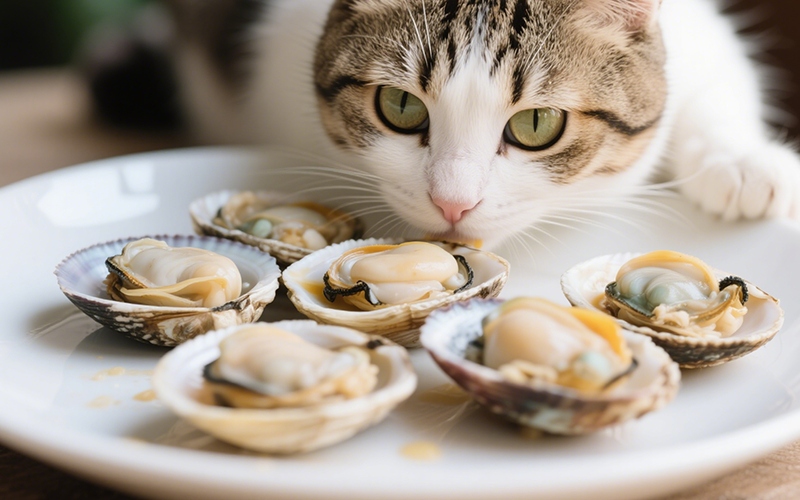
Seafood Surprise: Can Cats Eat Clams Safely? (Vet-Reviewed Risks & Guide)
- 15 Apr 2025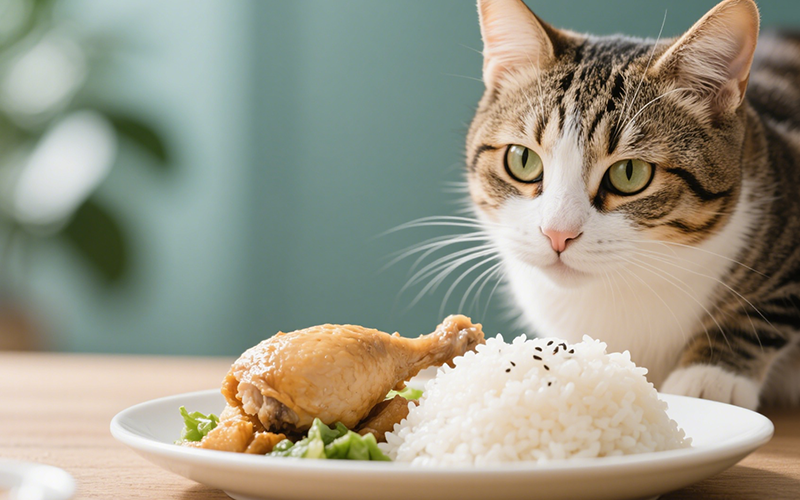
Chicken & Rice for Cats: Safe Treat or Dietary Danger? (Vet-Reviewed Guide)
- 15 Apr 2025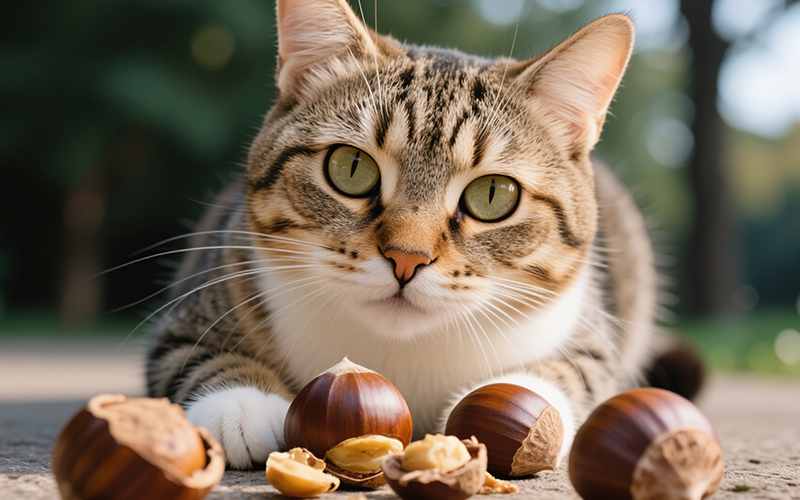
Nutty Concerns: Can Cats Eat Chestnuts Safely? Vet Explains the Risks (True vs. Horse Chestnuts)
- 15 Apr 2025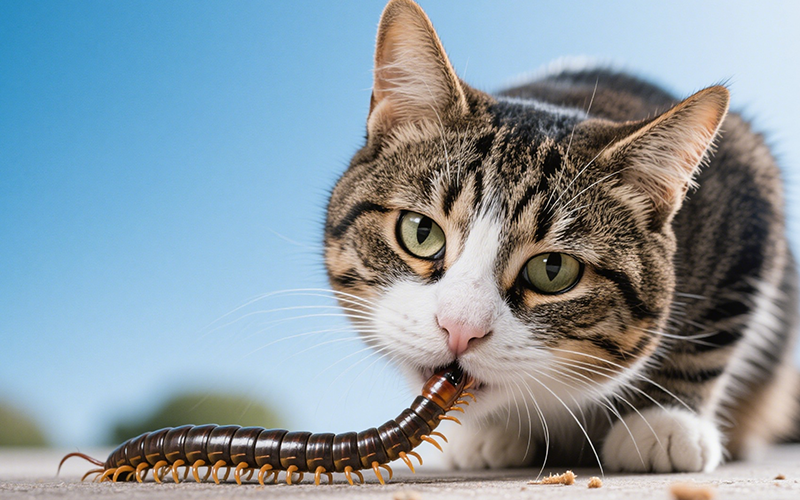
Creepy Crawly Cuisine? Can Cats Eat Centipedes Safely? (Vet-Reviewed Warning)
- 15 Apr 2025
The Gourd Guide: Can Cats Eat Canned Pumpkin Safely? Vet-Reviewed Benefits & Risks
- 15 Apr 2025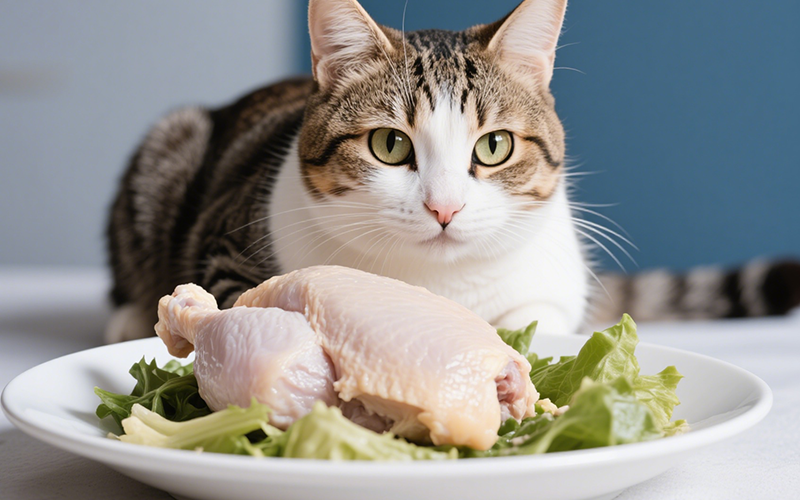
Boiled Chicken for Cats: A Purrfectly Safe Treat or Potential Pitfall? (Vet-Reviewed Guide)
- 15 Apr 2025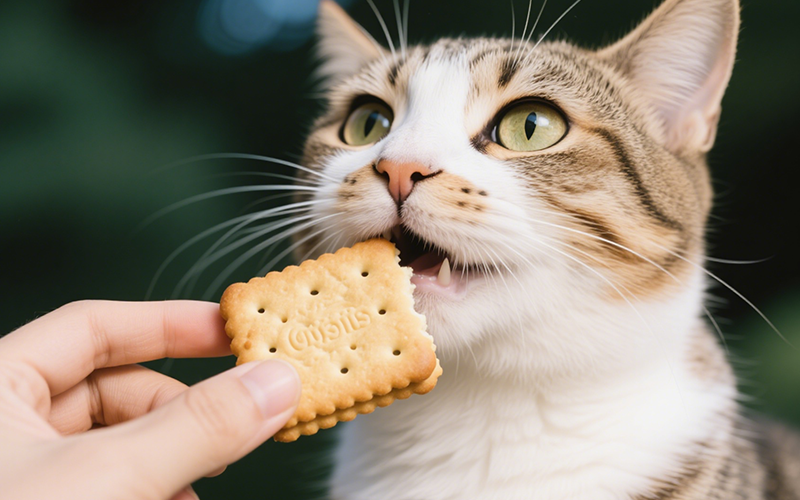
The Crumbly Truth: Can Cats Eat Biscuits Safely? Vet Warns of Hidden Dangers
- 15 Apr 2025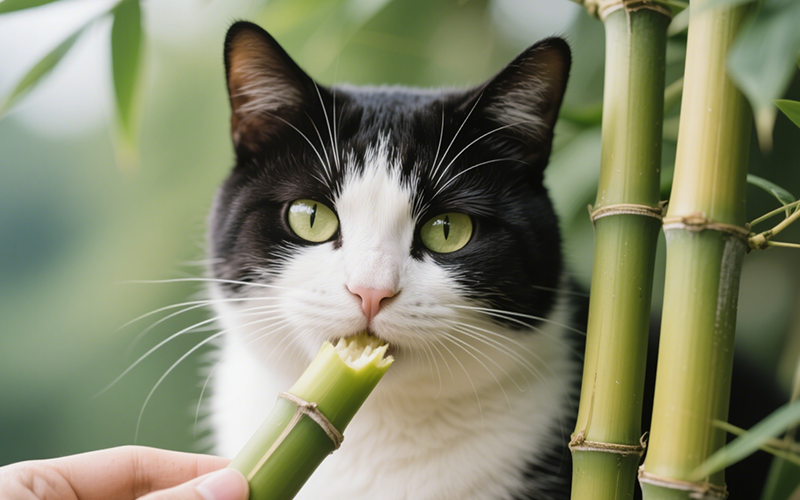
Green Stalks & Curious Cats: Can Cats Eat Bamboo Safely? (Vet-Reviewed Guide)
- 15 Apr 2025
Beef Liver for Cats: Nutrient Powerhouse or Risky Treat? (Vet-Reviewed Safety Guide)
- 15 Apr 2025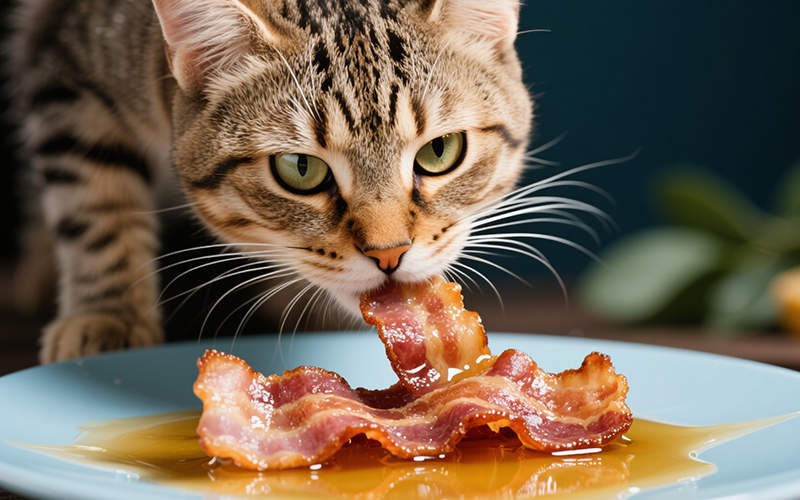
Fat Trap Alert: Can Cats Eat Bacon Grease Safely? (Vet-Reviewed Dangers)
- 15 Apr 2025
